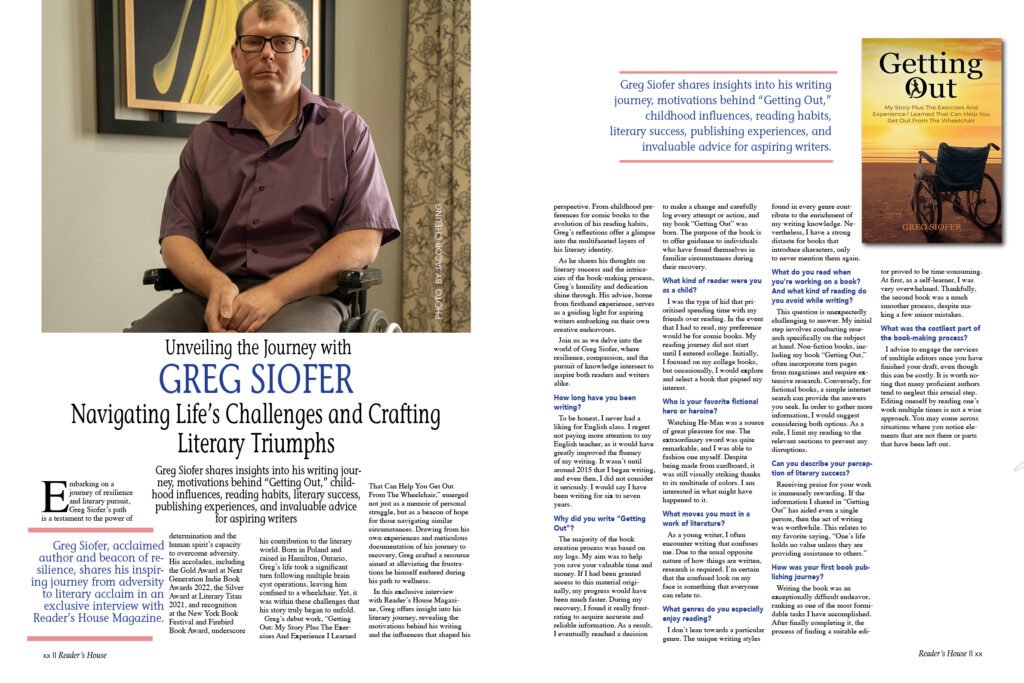Navigating Life’s Challenges and Crafting Literary Triumphs
Greg Siofer shares insights into his writing journey, motivations behind “Getting Out,” childhood influences, reading habits, literary success, publishing experiences, and invaluable advice for aspiring writers
Embarking on a journey of resilience and literary pursuit, Greg Siofer’s path is a testament to the power of determination and the human spirit’s capacity to overcome adversity. His accolades, including the Gold Award at Next Generation Indie Book Awards 2022, the Silver Award at Literary Titan 2021, and recognition at the New York Book Festival and Firebird Book Award, underscore his contribution to the literary world. Born in Poland and raised in Hamilton, Ontario, Greg’s life took a significant turn following multiple brain cyst operations, leaving him confined to a wheelchair. Yet, it was within these challenges that his story truly began to unfold.
Greg’s debut work, “Getting Out: My Story Plus The Exercises And Experience I Learned That Can Help You Get Out From The Wheelchair,” emerged not just as a memoir of personal struggle, but as a beacon of hope for those navigating similar circumstances. Drawing from his own experiences and meticulous documentation of his journey to recovery, Greg crafted a resource aimed at alleviating the frustrations he himself endured during his path to wellness.
In this exclusive interview with Reader’s House Magazine, Greg offers insight into his literary journey, revealing the motivations behind his writing and the influences that shaped his perspective. From childhood preferences for comic books to the evolution of his reading habits, Greg’s reflections offer a glimpse into the multifaceted layers of his literary identity.
As he shares his thoughts on literary success and the intricacies of the book-making process, Greg’s humility and dedication shine through. His advice, borne from firsthand experience, serves as a guiding light for aspiring writers embarking on their own creative endeavours.
Join us as we delve into the world of Greg Siofer, where resilience, compassion, and the pursuit of knowledge intersect to inspire both readers and writers alike.
How long have you been writing?
To be honest, I never had a liking for English class. I regret not paying more attention to my English teacher, as it would have greatly improved the fluency of my writing. It wasn’t until around 2015 that I began writing, and even then, I did not consider it seriously. I would say I have been writing for six to seven years.
Why did you write Getting Out ?
The majority of the book creation process was based on my logs. My aim was to help you save your valuable time and money. If I had been granted access to this material originally, my progress would have been much faster. During my recovery, I found it really frustrating to acquire accurate and reliable information. As a result, I eventually reached a decision to make a change and carefully log every attempt or action, and my book Getting Out was born. The purpose of the book is to offer guidance to individuals who have found themselves in familiar circumstances during their recovery.
What kind of reader were you as a child?
I was the type of kid that prioritised spending time with my friends over reading. In the event that I had to read, my preference would be for comic books. My reading journey did not start until I entered college. Initially, I focused on my college books, but occasionally, I would explore and select a book that piqued my interest.
Who is your favorite fictional hero or heroine?
Watching He-Man was a source of great pleasure for me. The extraordinary sword was quite remarkable, and I was able to fashion one myself. Despite being made from cardboard, it was still visually striking thanks to its multitude of colors. I am interested in what might have happened to it.
What moves you most in a work of literature?
As a young writer, I often encounter writing that confuses me. Due to the usual opposite nature of how things are written, research is required. I’m certain that the confused look on my face is something that everyone can relate to.
What genres do you especially enjoy reading?
I don’t lean towards a particular genre. The unique writing styles found in every genre contribute to the enrichment of my writing knowledge. Nevertheless, I have a strong distaste for books that introduce characters, only to never mention them again.
What do you read when you’re working on a book? And what kind of reading do you avoid while writing?
This question is unexpectedly challenging to answer. My initial step involves conducting research specifically on the subject at hand. Non-fiction books, including my book “Getting Out,” often incorporate torn pages from magazines and require extensive research. Conversely, for fictional books, a simple internet search can provide the answers you seek. In order to gather more information, I would suggest considering both options. As a rule, I limit my reading to the relevant sections to prevent any disruptions.
Can you describe your perception of literary success?
Receiving praise for your work is immensely rewarding. If the information I shared in Getting Out has aided even a single person, then the act of writing was worthwhile. This relates to my favorite saying, “One’s life holds no value unless they are providing assistance to others.”
How was your first book publishing journey?
Writing the book was an exceptionally difficult endeavor, ranking as one of the most formidable tasks I have accomplished. After finally completing it, the process of finding a suitable editor proved to be time-consuming. At first, as a self-learner, I was very overwhelmed. Thankfully, the second book was a much smoother process, despite making a few minor mistakes.
What was the costliest part of the book-making process?
I advise to engage the services of multiple editors once you have finished your draft, even though this can be costly. It is worth noting that many proficient authors tend to neglect this crucial step. Editing oneself by reading one’s work multiple times is not a wise approach. You may come across situations where you notice elements that are not there or parts that have been left out.
Follow the Author




